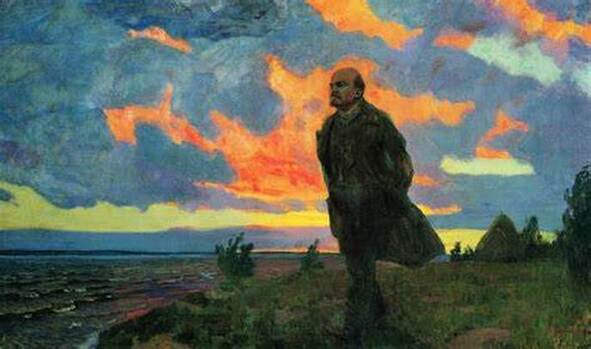|
12/13/2021 V. I. Lenin - Materialism & Empirio-Criticism. Commentary and Analysis (12/23). By: Thomas RigginsRead NowCHAPTER THREE: THE THEORY OF KNOWLEDGE OF DIALECTICAL MATERIALISM AND OF EMPIRIO-CRITICISM. SECTION THREE: "Causality and Necessity in Nature" Lenin thinks the question of causality is important and wants to begin to look at this issue from the standpoint of materialist epistemology. To do this he turns to Feuerbach's criticism of the philosopher Rudolf Haym [1821-1901, member from the center right of the National Assembly at Frankfort in 1848 and best known for his 1857 biography of Hegel] whom Feuerbach attacked on this issue. Feuerbach quotes what Haym says about Feuerbach's book The Essence of Religion. "Nature and human reason are for [Feuerbach] completely divorced, and between them a gulf is formed which cannot be spanned from one side or the other." Haym is responding to Feuerbach's statement in his book that we "apply human expressions and conceptions to [the phenomena of nature], as for example: order, purpose, law; and are obliged to do so because of the character of our language." Feuerbach goes on to point out that the big split between nature and human reason that Haym sees is not really there. He says his statement "does not assert that there is actually nothing in nature corresponding to the words or ideas of order, purpose, law." He was just trying to deny their identity (Idealism). Feuerbach in fact claims that it is theism that makes this division, not materialism. "The reason of the theists splits nature into two beings -- one material, and the other formal or spiritual." Lenin discusses this Feuerbach-Haym dispute and concludes, "Feuerbach's views are consistently materialist." Lenin says, "The recognition of objective law in nature and the recognition that this law is reflected with approximate fidelity in the mind of man is materialism." We should keep in mind the expression approximate fidelity as Lenin often gets a bit carried away and talks about photographic equivalence which many interpret as absolute fidelity. This may be too strong a claim. Since Marx and Engels were influenced by Feuerbach (he was the bridge between them and Hegel, his philosophy being a materialist mutation of Hegel's Objective Idealism), Lenin makes the following remark about Engels that "to anyone who has read his philosophical works at all attentively it must be clear that Engels does not admit even a shadow of doubt as to the existence of objective law, causality and necessity in nature." Lenin now makes some comments about Joseph Dietzgen who had been portrayed by the Machists as a subjectivist with respect to causality. Lenin tells us that while "we can find plenty of confusion, inexactnesses and errors in Dietzgen" so that as a philosopher "he is not entirely consistent", nevertheless the Machist view of him is totally false. He was a materialist and, Lenin quotes him as saying "that 'the causal dependence' is contained 'in the things themselves'." Lenin now demonstrates that Avenarius' line on causality is the same as that of Hume and his agnosticism on this issue. Avenarius, just as Hume, says we do not observe "causes" in nature, ie., "necessity", "All we experience," says Avenarius, "is that the one [event] follows the other.... Necessity therefore expresses a particular degree of probability with which the effect is, or may be, expected." Lenin calls this "subjectivism." With the development of physics in the last one hundred years, especially quantum mechanics, this has become the standard scientific view regarding "causality" and Lenin appears to be wrong in this respect. Materialism can live with a probabilistic universe if it recognizes that probability is an objective feature of reality as it presents itself to us. But Mach and Avenarius are not justified by these developments. Mach says, "In nature there is neither cause nor effect.... I have repeatedly demonstrated that all forms of the law of causality spring from subjective motives and that there is no necessity for nature to correspond with them." Modern science and modern materialism detect probability frequencies as objective features of quantum interactions independent of "subjective motives." Since, as Lenin says, the real issue is whether causal connections are the result of "objective natural law or properties of our mind", there is nothing in modern science that does not support the materialist position. Lenin deals in a similar fashion with Pearson (who says “Man is the maker of natural law”), Petzoldt (who says "Our thought demands definiteness from nature, and nature always accedes to this demand; we shall even see that in a certain sense it is compelled to accede to it"), Willy (who maintains "We have long known, from the time of Hume, that 'necessity' is a purely logical (not a 'transcendental' characteristic...". Now, two new subjectivists pop up: Henri Poincare [1854-1912, world famous French scientist] ("The only true objective reality is the internal harmony of the world," and this does not exist except in us); and Philipp Frank [1884-1966, Austrian scientist who later became a logical positivist who taught at Harvard] ("experience merely fills in a framework which man brings with him by his very nature...."). All the above were anti-materialism, or at least agnostics, and the reason Lenin added them to his critique was because they only varied here and there from Hume and Kant. These variations led P. S. Yushkevich (1873-1945, Russian Menshevik)) and other Russian Machists to hail them as producing new ideas in philosophy. Lenin thinks that is nonsense. Lenin says the essence of these "new" viewpoints "does not necessarily lie in the repetition of Kant's formulation, but in the recognition of the fundamental idea common to both Hume and Kant, viz., the denial of objective law in nature and the deduction of particular 'conditions of experience', particular principles, postulates and propositions from the subject, from human consciousness, and not from nature." Lenin then grants that the Russian Machists "would like to be Marxists" and have read Engels' views on causality but are utterly confused. Yushkevich, for example, "preaches" a new fad called "empirio- symbolism" and informs us that energy, in his own words, "is just as little a thing, a substance, as time, space, mass and other fundamental concepts of science: energy is a constancy, an empirio-symbol, like other empirio-symbols that for a time satisfy the fundamental human need of introducing reason, Logos, into the irrational stream of experience." And let us not forget Bogdanov's "Empirio-monism" where we can read that the laws of nature "are created by thought as a means of organising experience, of harmoniously co-ordinating it into a symmetrical whole."None of this derives from the thought of Marx or Engels but derives from the philosophy of Kant. Next Up: Chapter Three, Section Four "The 'Principle of Economy of Thought' and the problem of the 'Unity of the World.'" AuthorThomas Riggins is a retired philosophy teacher (NYU, The New School of Social Research, among others) who received a PhD from the CUNY Graduate Center (1983). He has been active in the civil rights and peace movements since the 1960s when he was chairman of the Young People's Socialist League at Florida State University and also worked for CORE in voter registration in north Florida (Leon County). He has written for many online publications such as People's World and Political Affairs where he was an associate editor. He also served on the board of the Bertrand Russell Society and was president of the Corliss Lamont chapter in New York City of the American Humanist Association.
0 Comments
Leave a Reply. |
Details
Archives
January 2022
Categories |


 RSS Feed
RSS Feed